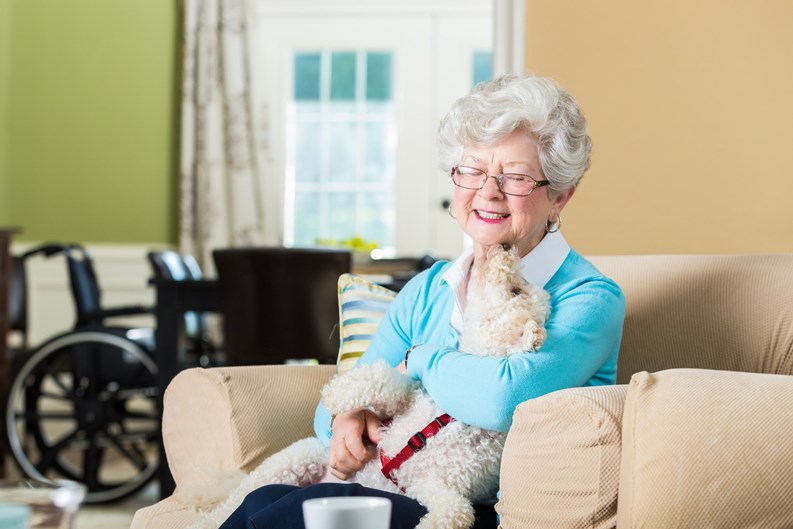This is the second part in a series on housing discrimination and multifamily buildings. Click here to read part one.
The legal definition of 'physical disability' has changed and expanded over the years. While it might be clear that someone using a wheelchair can’t climb the stairs, and a person who is sight-impaired might be easily identified by their service animal, other legally recognized disabilities are less apparent to a casual observer. In light of that, the Legal Information Institute defines disability as “a physical or mental impairment that substantially limits one or more major life activities of such individual.”
According to Deborah B. Koplovitz, a shareholder with the Anderson Kill law firm in New York City this definition impacts the boards and management of condos, co-ops, and HOAs in that “A board is required to make (or permit) ‘reasonable accommodations’ to the rules and regulations and to the structure of the building, in order to make the housing handicapped accessible. A board is also required to refrain from retaliating against a cooperator or condo owner who has made a request or a complaint about certain treatment. However, a board is not required to consent to unreasonable accommodations; to accommodations which cause an undue burden, or which are structurally infeasible; or under federal law, which would fundamentally alter the nature of the housing.”
What constitutes 'reasonable accommodation' is fairly straightforward when it comes to physical disabilities; installing a ramp, for example, or widening doorways to make space for a wheelchair to pass through. But what about people with mental health challenges, especially those who need a service animal? What is the building’s obligation in this case, and what board/management actions could lead to potential claims of discrimination?
The No-Pet Rule and Service Animals
A common prohibition in many co-op buildings is the ban on some pets -- usually dogs. There are lots of reasons why individual buildings choose to prohibit dog ownership. Unlike cats, dogs need to be walked frequently; this alone inevitably means a certain number of ‘accidents’ in the lobby and other common areas through which dogs may pass on their way outside. Dogs also make substantially more noise, and can get rambunctious in the elevator or hallways, which may lead to damage to carpet, wall coverings or other common elements.
For some people however, the companionship and assistance dogs provide are critical to that person being able to function on their own.
“The laws all require that reasonable accommodations to the rules and regulations are provided so that a disabled person can use their apartment,” says Koplovitz. In order to legally override a building's no-pet policy, “The resident needs to submit a qualified health professional’s letter attesting to the mental health condition(s), and meeting all the legal requirements to prove a disability, and that the animal has been prescribed as treatment for that condition. “
She adds that each law is slightly different in what is required to meet the legal criteria of a “disabled” person, so a board should be very careful when responding to any such letter received and consult with an attorney prior to making any decision about whether to permit or deny permission for a companion or emotional support animal.
“Any outright rejection could trigger a housing discrimination claim,” Koplovitz explains. “That being said, where the person providing a letter is not qualified, or the letter is suspicious – for example, if a male resident produces a letter from a gynecologist, and the letter nevertheless states that the resident is ‘under the care’ of that gynecologist, the letter would lack credibility, and a board should be fairly safe pointing out the issues with a doctor’s letter such as that one.”
Exotic Pets
Often ‘pet-free’ policies will pertain to more than cats and dogs. While a co-op or condo may permit cats or even dogs, they may have a flat-out prohibition against other types of pets, such as snakes, rodents, and insects. When a resident claims to require an 'exotic' companion animal, that can sometimes pose a problem.
Koplovitz relates the story of a woman who, due to her autism, kept a boa constrictor as a service animal. The woman would become extremely overwhelmed in large groups and be unable to speak in public. However, with the snake wrapping around and gently squeezing her, she would be able to communicate more effectively and comfortably in the presence of other people. She would routinely bring the snake to co-op meetings so as to be able to participate more easily. Despite the unorthodox species, the snake was clearly a service animal that helped the woman to function better. As such, a prohibition against it attending the meeting -- or for that matter being allowed into the building -- would likely be found to be discriminatory.
What Are the Guidelines?
A good measure to determine what factors your co-op or condo should consider in making decisions regarding the use of service animals is the Department of Housing and Urban Development’s (HUD) 2013 guidelines. Koplovitz notes that HUD has changed its term from 'service animal' to ‘assistance animal.’
According to HUD, housing providers must consider the following:
(1) Does the person seeking to use and live with the animal have a disability-- i.e., a physical or mental impairment that substantially limits one or more major life activities?
2) Does the person making the request have a disability-related need for an assistance animal? In other words, does the animal work, provide assistance, perform tasks or services for the benefit of a person with a disability; or provide emotional support that alleviates one or more of the identified symptoms or effects of a person’s existing disability?
HUD guidance says that if the answer to either question is “no,” then a reasonable modification to the housing provider’s no-dog rule is not required, and a request for an assistance dog may be denied.
In short, when faced with questions relating to potential housing discrimination, co-op and condo boards should consult with their attorney. The law is complex, but fair to both sides, and for the sake of fairness should be observed with the best of intentions.
In the next installment of this series, we will look at the various classes of protected individuals.
AJ Sidransky is a published novelist and staff writer for The Cooperator.







Leave a Comment